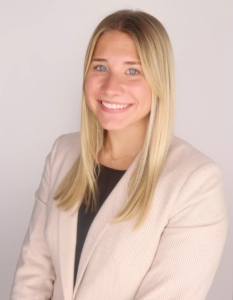
Students work inside the Student Management Investment Fund lab at Freeman College of Management. SMIF is a two-semester experiential course in which a select group of Bucknell University seniors manage nearly $3 million of the university’s endowment. Courtesy photo
Both as a student and a citizen of the world, Lauren Rader has always pursued a multitude of interests. She plays lacrosse, is passionate about photography, and as a student of the Freeman College of Management, volunteered at a local crisis center for domestic violence and abuse victims. The rising senior is majoring in Managing for Sustainability while minoring in Social Justice.
“FCOM emphasizes being ‘well-rounded, grounded, and compassionate business leaders.’ I feel supported as more than just a student but as a whole person,” Rader tells Poets&Quants. “FCOM taught me that my success as a business leader is more than just my classroom performance; it encompasses emotional intelligence, inclusivity, and creativity.”

Lauren Rader
This year, Freeman celebrates its fifth anniversary as an academic college at Bucknell University – a private university in Lewisburg, Pennsylvania. Bucknell describes its three academic pillars – Arts & Science, Engineering, and Management – as “three colleges, one Bucknell,” and it ingrains an interdisciplinary approach grounded in liberal arts across all of them.
“Unlike many other business colleges, FCOM allows me to complement my major with liberal arts classes. I believe this well-rounded education equips me to utilize a multi-dimensional approach to problem-solving and to think on a deeper level, which will ultimately prepare me to thrive beyond Bucknell,” Rader says.
UNDER THE RADAR
Dean Raquel Alexander likes to say Freeman College of Management is a century old startup. Though the college itself only officially formed in 2017, Bucknell University has had management education for more than 100 years.
On July 1, FMOC officially marked its fifth anniversary, evolving from a department at Bucknell, to a school, and now to a full-fledged college. It quickly gained accreditation by the Association to Advance Collegiate Schools of Business (AACSB), and has doubled the size of its faculty. While it used to admit around 90 freshmen at the start of the academic year, it admitted close to 200 last fall. In our 2022 ranking of the Best Undergraduate Business Schools, Bucknell’s Freeman scored its first top 20 rank, surging to No. 17 after finishing No. 35 just two years earlier.
The college offers seven majors, including a new program in business analytics, along with two minors, including the debut of a minor in real estate. Each FMOC student is empowered to create their own paths of study, typically graduating with more than half of their classes taken from the other Bucknell colleges.
“We’ve built bespoke majors that allow students to customize their paths and build concentrations in the arts and sciences,” Alexander says. “For example, our global management major only has four required classes, because we ask students to build a concentration in another part of the world. Or maybe a student is interested in graphic arts. There’s room for photography, web design, and VR classes. It allows for exploration and integration with the liberal arts.”
For all these reasons, we selected FMOC for this installment for Under The Radar, a periodic feature series highlighting the hidden gems, the best kept secrets, and innovative programs in undergraduate business education. (Read previous installments “Horn Entrepreneurship: Giving Silicon Valley A Run For Its Money” and “Inside Darla Moore’s Pipeline To Top Wall Street Firms.”)
“The small class size, outstanding faculty, and bonds with my peers have helped me
create an invaluable academic experience in FCOM,” Rader says. “As students, we are afforded the unique privilege of unabated access to our professors, which has allowed me to build strong relationships with them. This dynamic enhances classroom discussion and collaboration.”

Holmes Hall is a 79,500-square-foot facility that houses both the Freeman College of Management and the department of Art and Art History. (Courtesy photo)
HOLMES HALL: A MARRIAGE OF ART & MANAGEMENT
When it was time to design a space for its new college of management, Bucknell’s trustees engaged in numerous conversations about what made them different. Those conversations always came back to an education grounded in the liberal arts, and the intentional marriage of its three colleges.
Take Steve Holmes, a Bucknell trustee for 15 years and chairman of Wyndham Hotels & Resorts/ Wyndham Worldwide, who graduated from Bucknell University in 1979. He majored in accounting, but figures he had enough art and art history credits to have declared a minor. He met his wife in a ballroom dancing class. His first job after college was as a CPA for Deloitte & Touche, and he often met with CFOs twice his age.
“What did I have to talk with them about? I talked about art because art connects everybody,” he tells P&Q. “It really gave me, in my opinion, a big leg up because I was more well rounded as an accountant than a lot of other people my age.”

Holmes Hall was named for Steve Holmes ’79 and his wife, Bonnie Bencsko Homes ’79. (Courtesy photo)
As a Bucknell trustee imagining the new home for the new college, Holmes remembers deep conversations with fellow trustee Makoto Fujimura, a Bucknell art major and ‘83 alumni. Art students need management exposure to help them manage their careers, Fujimura argued. Business majors need liberal arts exposure to help them communicate and connect to the world in which they will work, Holmes added.
Together, the two built momentum around the idea of housing both the new management college and the department of art and art history in the same state-of-the-art facility. Holmes Hall opened to students in August of 2021.
“It’s had an immediate impact for better collaboration between the two disciplines. It’s really a confluence, like two streams coming together, instead of an intersection where accidents happen,” Holmes, the building’s namesake, says. “It’s what it should have been all along.”
In any given semester, 15 different departments are teaching in the building, Alexander says. The whole third floor is a creativity and innovation hub with maker spaces, an architectural studio, a dark room, and a virtual reality lab. On Friday nights, the Bucknell football team watches their game films in an auditorium there, and management faculty offices are in proximity to the literary arts faculty.
“And we teach finance up there too,” Alexander says. “It’s a facility for the whole university, and just a really, really unique space.”
NEXT PAGE: An Immersive, experiential student experience + Punching above its weight











Questions about this article? Email us or leave a comment below.